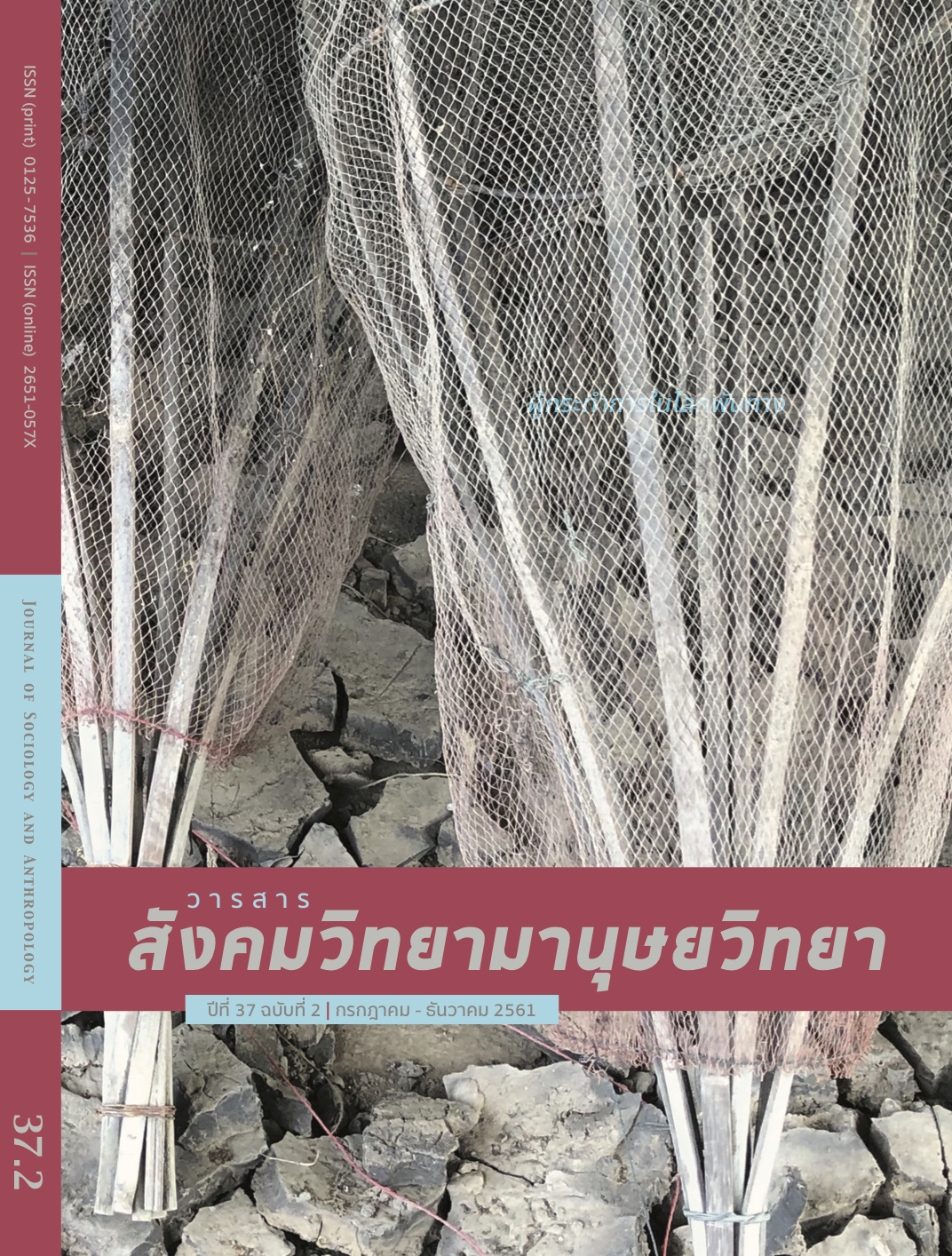Private Supplementary Tutoring as a Social Practice: A case study of senior high school students in Chiang Mai
Keywords:
Private Supplementary Tutoring, Sociology of Education, Strong Structuration TheoryAbstract
This article presents findings from a research on private supplementary tutoring as a social phenomenon within competitive education system. The research draws on a conceptual framework of Strong Structuration Theory (SST) and is based on in-depth interviews and observation among a sampling group of senior high school students in Chiangmai. The article illustrates how contingent relationships between external and internal structures play an important role in students’ perception and uptake of private supplementary tutoring as an essential strategy for their university entrance examination. Whilst the external structures are common conditions for all students, SST analysis elucidates how internal structures, or the roles of diverse social institutions, have constituted their diverse experiences and perspectives towards private supplementary tutoring. As a form of social practice, private supplementary tutoring might appear to reproduce external and internal structures, which in turn leads to the institutionalisation of itself. However, the research has also pointed to some transformative consequences such that students are not entirely dominated by formal education, but have appropriated elements of the system under the conditions of their diverse internal structures.
References
กนกวรรณ รุ้งตาล. 2558. “การสอนพิเศษ: ความจำเป็นที่ถูกสร้างขึ้นจากโครงสร้างการศึกษา.” วารสารสังคมวิทยามานุษยวิทยา 34(1): 134-151.
กระทรวงศึกษาธิการ. 2551. หลักสูตรแกนกลางการศึกษาขั้นพื้นฐาน พุทธศักราช 2551. กรุงเทพมหานคร: ชุมนุมสหกรณ์การเกษตรแห่งประเทศไทย.
กาญจนา แก้วเทพ และ สมสุข หินวิมาน. 2553. สายธารแห่งนักคิดทฤษฏีเศรษฐศาสตร์การเมืองกับสื่อสารศึกษา. กรุงเทพฯ: อินทนิล.
เชษฐา พวงหัตถ์. 2548. โครงสร้าง - ผู้กระทำการ. กรุงเทพฯ: คณะกรรมการสภาวิจัยแห่งชาติ สาขาสังคมวิทยา สำนักงานคณะกรรมการวิจัยแห่งชาติ.
ปริชัย ดาวอุดม และ สุรวุฒิ ปัดไธสง. 2557. “กฎหมาย: ปัจจัยที่เอื้อต่อการขยายตัวของโรงเรียนกวดวิชา.” รัฐสภาสาร 62(3): 87-105.
ปริชัย ดาวอุดม. 2557. “การทำให้โรงเรียนกวดวิชาเป็นโครงสร้างที่มีเสถียรภาพในสังคม.” วิทยานิพนธ์ดุษฎีบัณฑิต สาขาวิชาพัฒนศึกษาศาสตร์, มหาวิทยาลัยศรีนครินทรวิโรฒ.
ปิ่นวดี ศรีสุพรรณ. 2555. “บทวิจารณ์หนังสือ: Rob Stones. Structuration Theory.” วารสารสังคมลุ่มน้ำโขง 8 (3): 191-200.
เปรมใจ วังศิริไพศาล. 2559. “ทางเลือกนโยบายการศึกษาสำหรับบุตรแรงงานต่างชาติในประเทศไทยภายใต้บริบทอาเซียน: การวิเคราะห์ตามทฤษฎีการก่อตัวของโครงสร้างความสัมพันธ์ทางสังคม.” วิทยานิพนธ์ครุศาสตรดุษฎีบัณฑิต, จุฬาลงกรณ์มหาวิทยาลัย.
ไพฑูรย์ สินลารัตน์ 2545. “การกวดวิชาระดับมัธยมศึกษาตอนปลายในประเทศไทย.” รายงานการวิจัย. กรุงเทพฯ: สำนักงานเลขาธิการสภาการศึกษา.
วาทินีย์ วิชัยยา. 2561. “โครงสร้างการศึกษาและวัฒนธรรมกวดวิชาของนักเรียนชั้น ม.6.” รายงานการวิจัย. ปทุมธานี: คณะสังคมวิทยาและมานุษยวิทยา มหาวิทยาลัยธรรมศาสตร์.
ศักดิ์สิทธิ์ คําหลวง และ ศุภรัก สุวรรณวัจน์. 2560. “การออกแบบอัตลักษณ์องค์กรชุมชนกาดกองต้าโดยใช้ทฤษฏีสัญศาสตร์ ต่อการรับรู้ทุนวัฒนธรรมชุมชนกาดกองต้า จังหวัดลำปาง.” ศิลปะสถาปัตยกรรมศาสตร์มหาวิทยาลัยนเรศวร 8(1): 24-39.
ศิวพล ชมภูพันธุ์. 2557. “เพราะการศึกษาไทยคือการสอบคำตอบคือ ‘กวดวิชา?’ โรงเรียนกวดวิชากับสังคมจังหวัดลำปาง.” มนุษยศาสตร์สังคมศาสตร์ปริทัศน์ 2 (2): 64-86.
สกาวรัตน์ ไกรมาก. 2553. “การวิเคราะห์กระบวนการประชาคมเพื่อพัฒนาการศึกษาของท้องถิ่น.” วิทยานิพนธ์ครุศาสตรดุษฎีบัณฑิต, จุฬาลงกรณ์มหาวิทยาลัย.
สิริภัทร ชื่นค้า. 2553. "ปัจจัยที่ส่งผลต่อการเรียนการสอนในสังคมไทย: ศึกษากรณีมุมมองทางด้านมานุษยวิทยาการศึกษาต่อการเรียนกวดวิชา." วิทยานิพนธ์มานุษยวิทยามหาบัณฑิต, จุฬาลงกรณ์มหาวิทยาลัย.
เอกสารภาษาอังกฤษ
Ballantine, Jeanne H. 1997. The Sociology of Education: A systematic analysis. New Jersey: Prentice-Hall, Inc.
Bourdieu, Pierre. (1972) 1977. Outline of a Theory of Practice. Cambridge: Cambridge University Press, trans. Richard Nice.
Bovornsiri, Varaporn. 2006. “Thailand.” In Higher Education in South-East Asia, 187-218. Bangkok: Asia-Pacific Programme of Educational Innovation for Development (APEID), United Nations Educational, Scientific and Cultural Organization (UNESCO), UNESCO Bangkok.
Boyce, Carolyn, and Palena Neale. 2006. Conducting In-depth Interviews:. Watertown: Pathfinder International.
Bray, Mark, and Chad Lykins. 2012. Shadow Education: Private Supplementary Tutoring and Its Implications for Policy Makers in Asia. Mandaluyong City, Philippines: Asian Development Bank.
Buchmann, Claudia, Dennis J. Condron, and Vincent J. Roscigno. 2010. “Shadow Education: Theory, Analysis and Future Directions.” Social Forces 89(2): 483-490.
Chan, Christine, Toity Deave, and Trisha Greenhalgh. 2010. “Childhood Obesity in Transition Zones: An Analysis Using Structuration Theory.” Sociology of Health & Illness 32(5): 711-729.
Chapple, Sandra. 2017. “IFRS Adoption in Australia: A Strong Structuration Perspective.” Accounting History 23(3): 1-31.
Fung, Anthony. 2003. "Cram Schooling in Hong Kong: The privatization of public education." Asian Anthropology 2(1): 179-195.
Giddens, Anthony. 1976. New Rules of Sociological Method: A positive critique of interpretative sociologies. London: Hutchinson.
Giddens, Anthony. 1979. Central Problems in Social Theory: Action, structure and contradiction in social analysis. Berkeley: University of California Press.
Giddens, Anthony. 1984. The Constitution of Society: Outline of the theory of structuration. Cambridge: Polity Press.
Jack, Lisa, and Ahmed Kholeif. 2007. “Introducing Strong Structuration Theory for Case Studies in Organization, Management and Accounting Research.” Qualitative Research in Organizations and Management: An International Journal 2(3): 208-225.
Malik, Muhammad Abid. 2017. "Shadow Education: Evolution, flaws and further development of the term." Social Sciences and Education Research Review 4(1): 16-29.
Sadovnik, Alan R. 2011. Sociology of Education: A critical reader. New York: Routledge.
Silova, Iveta, and Mark Bray. 2006. “Introduction.” In Education in a Hidden Marketplace: Monitoring of private tutoring (overview and country reports), 17-23. Budapest: Education Support Program (ESP) of the Open Society Institute.
Stevenson, David Lee, and David P. Baker. 1992. “Shadow Education and Allocation in Formal Schooling: Transition to university in Japan.” American Journal of Sociology 97(6): 1639-1657.
Stones, Rob. 2005. Structuration Theory. New York: Palgrave Macmillan.
Stones, Rob, and Ake Tangsupvattana. 2012. “Social Theory, Current Affairs, and Thailand's Political Turmoil: Seeing beyond reds vs. yellows.” Journal of Political Power 5(2): 217-238.
Wai-ho, Yung. 2011. “Shadow Education in Hong Kong: The experience of learners of English.” Master’s Thesis (Applied Linguistics), The University of Hong Kong.
Yamato, Yoko, and Wei Zhang. 2017. "Changing Schooling, Changing Shadow: Shapes and Functions of Juku in Japan." Asia Pacific Journal of Education 37(3): 329-343.



